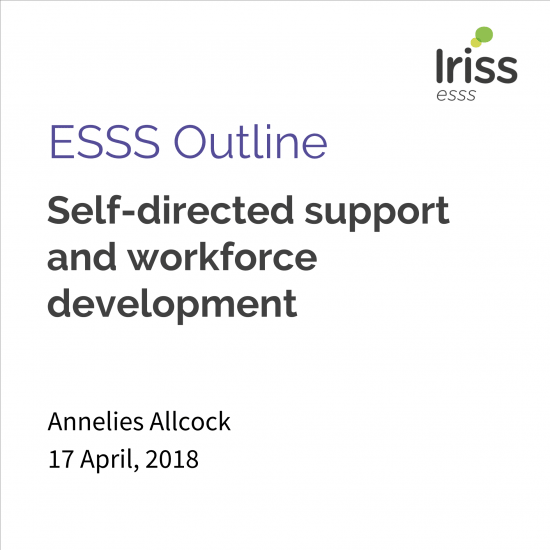Social Services Awards 2019
Self-directed support and workforce development
ESSS Outline
Exploring the relationships between evidence and innovation in the context of Scotland’s social services
Executive summary of report written by Jodie Pennachia
Executive summary
This report uses theoretical, empirical and practice literatures and case studies to reflect on the links between evidence and innovation in the context of Scotland's social services. It bridges two of the core work streams at Iriss; evidence-informed practice and innovation and improvement.
Imagining the Future: Workforce
The future social services workforce in Scotland 2025
Background
Aims and ambitions
Over the next 10-15 years there are likely to be significant changes both in the numbers requiring access to support and the strategies for responding to this.
Self-directed support and peer support
Pam Duncan
Pam Duncan, Policy Officer at Independent Living in Scotland project, speaks about her experiences of self-directed support in Scotland.
Criminal justice in Scotland - Mary Munro
Research soundbite
Mary Munro talks about a new book she edited with Hazel Croall and Gerry Mooney, entitled 'Criminal Justice in Scotland'. The book was published in December 2010, for further details see Criminal Justice in Scotland.
In this clip Mary talks about some of the key themes and issues explored in the book:
Football related violence in Scotland
Crime and Justice Research
Dr Niall Hamilton-Smith of the Scottish Centre for Crime and Justice Research and Dr David McArdle of the Stirling Law School discuss football related violence and disorder in Scotland, with particular reference to the use and efficacy of banning orders.
This recording is part of a 'discussion series' which aims to encourage and capture discussion and debate, and to share academic thinking and research findings as widely as possible.
Embracing change
Five guides on the topic of innovation in social services in Scotland
These guides aim to explore how you can approach innovation in your social services organisation, embracing the change that presents, and managing the risks that ensue.
Attitudes and approaches to evidence, innovation and improvement in social services in Scotland
The Iriss has three programmes through which it delivers its work: evidence-informed practice, innovation and improvement, and knowledge media. Iriss wished to conduct research to examine attitudes, approaches, use and barriers to innovation and improvement and evidence-informed practice in the sector which could be used as a baseline for future research to track and monitor attitudinal change. The objectives of the research were to:








